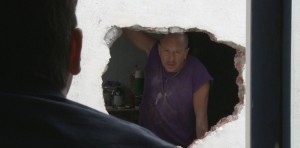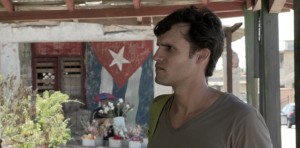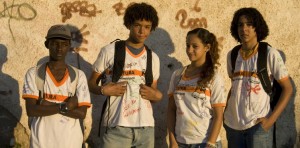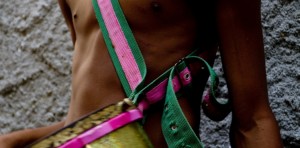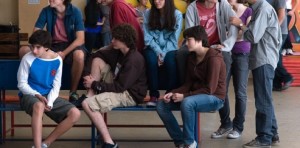I recently attended five films during this year’s Vancouver Latin American Film Fest that took place September 1-11. Here’s a brief recap of the films.
The Man Next Door
Spanish with English subtitles/ 100 min
Argentina, 2009
Leonardo, a successful industrial designer, lives with his family in an architectural wonder, a Mid-Century modern Le Corbusier house in Buenos Aires. One morning, he wakes to an irksome noise and is appalled to discover that workmen next door are constructing a large window that faces directly into his home. Victor, the neighbour, is an odd and extroverted character whose attitude is very friendly, yet threatening at the same time. He provokes in Leonardo both a strong dislike and an uncomfortable submissiveness to his will. This minor incident starts to take over Leonardo’s time, taking him away from his work and family and calling into question all his bourgeois illusions of power, seems the neighbour Victor just wants the other neighbour to be friends.
The Old House
Spanish with English subtitles/ 90 min
Cuba, 2010
Upon learning that his father is on his deathbed, Esteban travels from Barcelona back to his native Cuba after an absence of fourteen years to be with his family in their time of grieving. But in his childhood home he encounters a past that has not changed: old family secrets, resentments and unresolved misunderstandings make time itself an apparent prisoner of the old house. Esteban, finally gets Diego to admit that he knew Esteban was gay. At the end the Director spoke and did a Q & A –a question came up about being gay and Cuban society etc and the director said his film has been well received both in Cuba and Miami.
5xFavela: Now by Ourselves
Portuguese with English subtitles/ 103 min
Brazil, 2010
A collection of shorts about people living in the Favella in Rio de Janeiro, Brazil. 5xFavela: Agora por nós mesmos is entirely written, directed and produced by young filmmakers mentored in professional workshops administered by big names in Brazilian cinema like Daniel Filho, Walter Salles, Fernando Meirelles and others. Composed of five different stories that achieve the feat of dialogue among each other, these films show the realities of honest families who are in need, whose lives can’t help but intersect with the complex life of the favela and the wider world outside. My favourite was the first one about a student who gets into Law school and has to sell drugs on the side to classmates to make money to support his family and his studies. He graduates at the top of his class and gets a job at a friend’s parents law firm.
The Samba Within Me
Portuguese with English subtitles/ 72 min
Brazil, 2010
Set in the Mangueira Hill favela in Rio de Janeiro during the pre-carnival period, this visually stunning documentary begins in the Estação Primeira de Mangueira samba hall, the place where director Geórgia Guerra-Peixe rediscovers her own family history in relation to the tradition of carnival. From the dance hall, she weaves her way up the Hill of Mangueira through the narrow streets and into peoples’ homes, driven by her desire to go beyond the samba to get to know the residents and history of her neighbourhood. Her camera’s viewpoint acquires melancholic variations and different rhythmic cadences, resulting in a composition that could be called the samba of a glance. Beyond the hall lies the samba of Geórgia Guerra-Peixe, a samba that is a way of being, of living and also, a way of singing and dancing. It was more about the music in her soul than a film about music.
The Best Things in the World
Portuguese with English subtitles/ 100 min
Brazil, 2010
In my opinion, this was the best film in the festival at least the best film that I saw. Mano is a 15-year-old boy experiencing the tumultuous transition from childhood to adulthood within the bustling metropolis of São Paulo, Brazil. He has to cope with his parents’ divorce and the discovery that his father is gay; his rebellious brother; conflicts with his peers, the discovery of his own sexuality, and the joys and pains of first love. The Best Things in the World approaches the experiences of modern, urban teenagers with honesty and humour.

